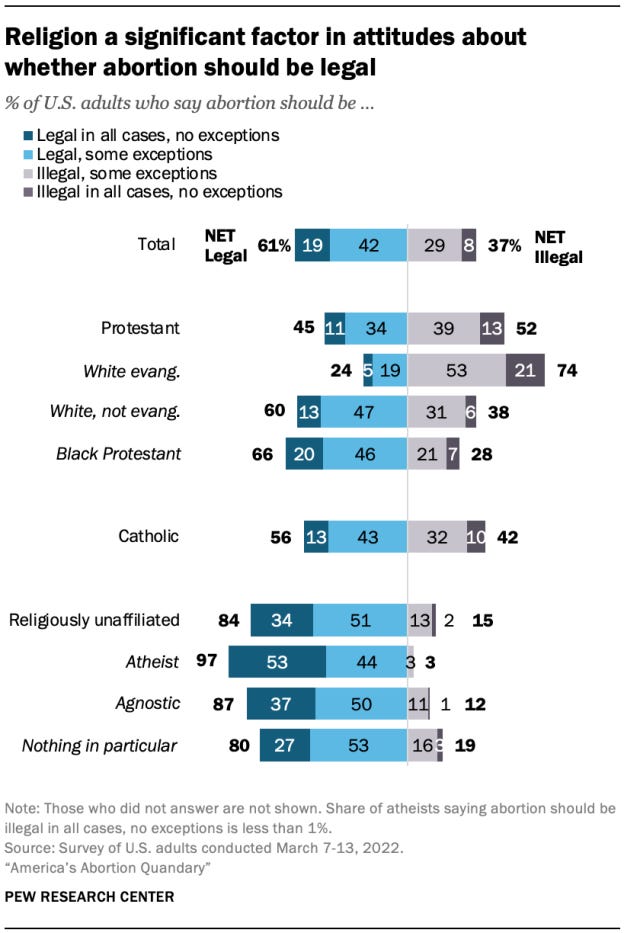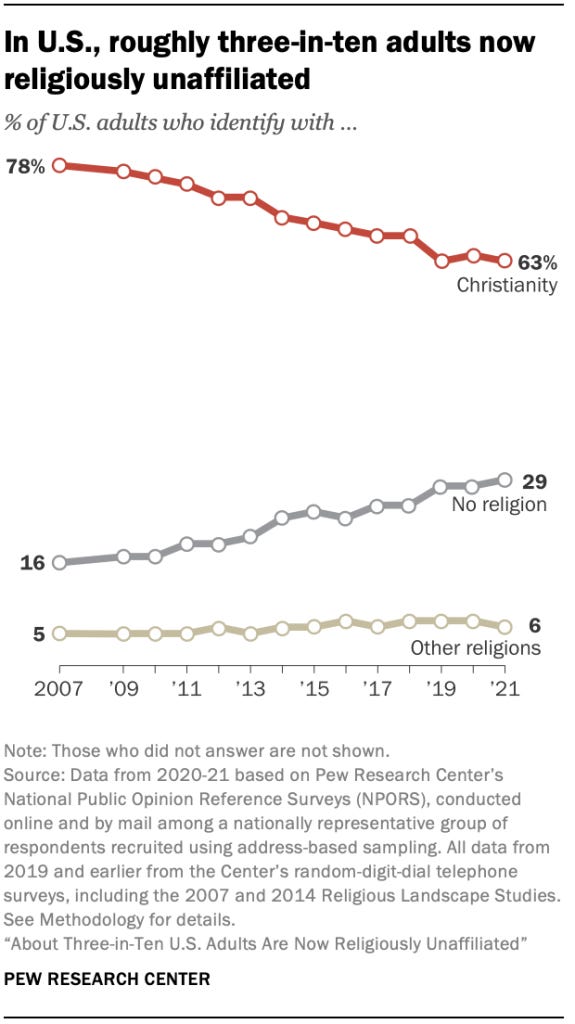End of Roe: Good for Choice?
Why I think the Dobbs decision will be good for mainstream acceptance of abortion.
Despite being in the “safe, legal, and rare” camp, I am not despairing (too much) about the end of Roe. This is because, all things considered, I don’t think the overturning will have the effect many presume.
In the long-run, I think it is likely that the Dobbs decision will be ultimately good for the mainstream acceptance of choice.
Here is why I think this might be:
1. Status quo bias and loss aversion bias are both in favor of pro-choice.
In general, people like to keep matters as they are—and given that Roe was fairly liberal in what it permitted, this means that when we see change, we will see it in the form of new restrictions. It wouldn’t be surprising if the status quo bias had an even stronger effect on political conservatives, who are generally predisposed towards tradition.
In addition, people don’t like to have things taken away once they have them. For example, it isn’t uncommon to see a Boomer ranting about entitlements, but when pressed, balking at the idea of having their social security or medicare compromised. The Affordable Care Act has put Republicans in a similar position. Their tune shifted from “repeal” to “repeal and replace”, because as it turns out the former is not politically palatable, even to their own base. In regards to Roe, Republicans are now in the position of taking things away.
2. People will now face the consequences of their own politics—which will strike pro-lifers unevenly.
I realize there really are many people opposed to abortion for whom this is a unique opportunity to live in a society which matches their values.
But I am willing to bet there are more pro-life hypocrites than pro-choice hypocrites—that is to say, there exist more people who are publicly anti-abortion but when it comes to their own unwanted pregnancy (or that of their child/wife/mistress), they would prefer to quietly have it taken care of. Of course rich people anywhere will always have the option of flying to a more accommodating state, but the average person can not. Nothing creates sympathy with a cause more than personal experience, and over time, the selfish desire to retain this option would tend to loosen staunch anti-abortion positions to more moderate views.
Moreover, another bias will affect judgements: the What You See is All There Is Bias. In this case, this means that pain that is visible matters more than pain that is invisible.
(Please note: I’m not making an ethical claim here. I am describing what I believe is a fault in our decision-making, but one I am sure will have an effect on many people).
It is one thing to claim that a 10-week old fetus is a human life, exactly like the human life of its mother. One might even believe that the pain felt by that fetus is the same as the pain of the adult human. But the fetus is silent and hidden away, and abortion procedures are private. Any harm that may be done to it is not visible.
What will not be so hidden is the pain of the women forced to undergo a pregnancy, of the family that must welcome the child. Over time, individual stories of sad people in desperate and extreme circumstances will crop up: coerced teenagers whose futures are ruined, women whose health is destroyed, or families that become destitute. We will hear of cases of people who did all the right things, but whose contraceptives failed. Worse, we will hear of women in abusive relationships who never had a choice. We might even hear of abandoned babies, perhaps even a rising number for state services to handle.
Regardless of how rare these cases might be, the stories will bubble up over the years, invade public consciousness, and pull heart-strings.
3. Pro-choice culture warriors have an extremely potent weapon on their side: The media.
All culture-making apparatuses are overwhelmingly progressive, and therefore, disproportionately in favor of pro-choice. In practice, this means the effect of the bias of “what you see is all there is” mentioned above will be heightened—as every horrible case will make headlines.
This is another way in which Roe v. Wade might have been (all things considered) bad for the mainstream acceptance of abortion. Ruth Bader Ginsberg herself said as much, many times. “My criticism of Roe is that it seemed to have stopped the momentum on the side of change,” she said. Roe’s broad, sweeping, undemocratic decision might have created more anger and forestalled (what was, up until Roe), a growing movement of abortion acceptance.
Meanwhile, with Roe in place, progressives were focused on the limited work of keeping the courts in their favor. Without it, they will wage a broader campaign for hearts and minds, focusing on voters rather than judges. Here is where the liberal advantage in culture-making institutions will come to bear fruit.
4. Finally, demographics are on the side of pro-choice.
Despite the refrain that abortion is a woman’s issue, the best predictor of attitudes is actually religious belief.
Consistently, opinion polls have found that the religious—particularly Christians— are far less favorable towards abortion than the non-religious. Especially hostile to abortion are the white evangelical Protestants.
But Christianity is on the decline in the United States, even the evangelical kind.
Between 2007 to 2021, evangelicals have gone from 30% of the population to 24%, while the religiously unaffiliated have risen.
While I don’t think any of these factors alone would make much of a difference, together, over the course of the coming years and decades, I think they will.
What do you guys think? What is the best evidence that I am wrong?




I think, ultimately, not so far in the future, the abortion question is resolved by technology. Someone develops an artificial womb, and someone else develops a procedure that can be had during the first trimester that moves the baby into it. The zillion dollar bill on the sidewalk is just too tempting.
At that point pro lifers 'win', so to speak, in that abortion becomes (give or take a generation and some edge cases that are never invoked) illegal, but they never 'win' in the sense that history will continue to regard them as the present regards them, as the antagonists of Very Special Episodes.
In the near term, I think that the repeal has a fairly muted outcome, in favor of pro choice politicians. It motives some people to vote who would not have otherwise bothered. This effect goes down over time as people experience the reality that the difference between the pre world of 'if you discover you are pregnant and need an abortion you go to a planned parenthood and get one' and the post world of 'if you discover you are pregnant and need an abortion you go to a planned parenthood in another state and get one' is far from the real world/mad max schism that it is being painted as.
I disagree about the idea that, in the longer term, people move between pro choice and pro life camps as the result of this. I hear you about the media, sympathy, etc, but it seems to me like those things were true yesterday as well. As far as evidence goes, all I've got is this, that If being the bad guys to the culture makers was going to persuade pro lifers and/or keep young people from joining them, their movement would have died sometime in the last 50 years.
David R
just now
I think you’re absolutely correct. Thanks.
Among other factors, finally reframing gay marriage as marriage equality shifted focus and helped create change. Similarly maybe pro-choice could be reframed. “Pro” suggests there is a “con.” Maybe some revised and updated versions of the old standbys Family Planning or Planned Parenthood. Maybe Reproductive Health Equality. (I’m not good at this naming stuff so please chime in.)